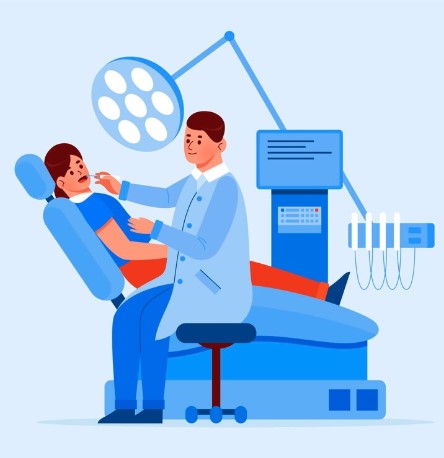Taking care of your oral health isn’t just about brushing, flossing, and visiting your dentist for regular cleanings. Sometimes, dental issues go beyond what a general dentist can address. That’s where oral surgeons step in—these specialists handle more complex procedures to ensure your mouth stays healthy and pain-free.
If you’ve ever wondered whether your situation calls for an oral surgeon, this guide is here to help. Here are the top signs that it might be time to book an appointment with one.
1. Persistent Jaw Pain or Stiffness
Do you wake up with jaw pain that doesn’t seem to go away? Perhaps your jaw clicks or locks when you open your mouth wide. These could be signs of a temporomandibular joint (TMJ) disorder, which often requires the expertise of an oral surgeon. Left untreated, TMJ disorders can lead to chronic discomfort, headaches, or difficulty chewing.
An oral surgeon can diagnose the problem and suggest treatments, ranging from therapy to surgical intervention, to improve your jaw’s functionality and relieve the pain.
2. Impacted or Problematic Wisdom Teeth
Wisdom teeth are notorious troublemakers. For some people, these late-arriving molars grow in without any problems. For others, they become impacted, meaning they don’t have enough space to erupt properly. This can lead to pain, swelling, infections, and even damage to neighboring teeth.
If your wisdom teeth are causing discomfort or show up on your dental X-rays as impacted, it’s a clear sign you need an oral surgeon to safely remove them.
3. Missing Teeth and Considering Dental Implants
Missing teeth can be more than just a cosmetic issue—they can affect your ability to chew, speak, and maintain proper oral health. Dental implants are a durable and natural-looking solution, but they require precision and expertise to place.
Oral surgeons are highly skilled in implant surgery, ensuring the titanium posts are anchored securely in your jawbone. They’ll also assess whether you need additional procedures like bone grafting to support the implant.
4. Chronic Oral Pain or Infections
Toothaches that won’t quit or recurring infections in your gums and teeth can be signs of deeper issues. For example, a cyst or abscess might be forming near the root of your tooth, requiring surgical removal.
Oral surgeons specialize in diagnosing and treating these conditions, often removing infected tissue or performing root-end surgeries to save the affected tooth. Delaying treatment could lead to more severe complications, so don’t wait too long to address persistent pain.
5. Facial or Oral Trauma
Accidents happen, and when they involve your face or mouth, the results can be both painful and distressing. Whether you’ve chipped a tooth, fractured your jaw, or suffered soft tissue damage, an oral surgeon can help restore both function and appearance.
These specialists are trained to handle a variety of trauma cases, ensuring your injuries heal properly and reducing the risk of long-term complications.
6. Difficulty Chewing or Speaking
If you’ve noticed changes in the way you chew or speak, it could indicate structural issues in your mouth. Misaligned jaws, overbites, or underbites can lead to discomfort and difficulty with everyday activities.
Oral surgeons can perform corrective jaw surgery (orthognathic surgery) to realign your jaw and improve your overall quality of life. This type of procedure isn’t just about aesthetics—it’s about restoring proper function to your mouth.
7. Suspicious Lumps or Sores
Lumps, bumps, or sores in your mouth that don’t heal within two weeks should never be ignored. These could be signs of oral cancer or other serious conditions. An oral surgeon can perform a biopsy to determine the cause and recommend a treatment plan if needed.
Early detection is key when it comes to oral cancer, so don’t hesitate to seek professional advice if you notice any unusual changes.
8. Sleep Apnea or Breathing Problems
Chronic snoring or pauses in breathing during sleep might point to obstructive sleep apnea. In severe cases, oral surgery may be necessary to correct structural issues contributing to the problem.
Procedures like repositioning your jaw or removing excess tissue can open your airway, helping you sleep better and reducing health risks associated with untreated sleep apnea.
What to Do Next?
Recognizing the signs that you need an oral surgeon is the first step toward resolving your dental issues. However, it’s essential to act quickly to prevent complications. Start by consulting with your general dentist, who can evaluate your condition and refer you to a trusted oral surgeon if necessary.
If you’re in need of specialized care, Crown Point Family Dentistry provides a comprehensive range of dental services. Whether you’re dealing with problematic wisdom teeth, considering implants, or facing other oral health concerns, they’ll guide you through the process to ensure you get the best possible care.
For residents looking for a Charlotte dentist who values your oral health, Crown Point Family Dentistry is here to help. Don’t let oral issues hold you back—schedule a consultation today and take the first step toward a healthier smile.










19 Comments
Mostbet to zaufana platforma dla miłośników zakładów sportowych | Z Mostbet możesz zagrać na automatach, ruletce i w pokera | Dzięki Mostbet logowanie możesz grać w swoje ulubione gry w kilka sekund Mostbet login Polska
Dobre promocje i przejrzyste zasady to ogromna zaleta tego serwisu | Legalne kasyna i bukmacherzy z licencją, polecam sprawdzić | Przydatne porady jak wypłacić pieniądze z konta | Wszystko opisane prostym językiem, bez zbędnego żargonu | Możliwość porównania ofert przed rejestracją | Świetna selekcja zakładów bukmacherskich esportowych | Często aktualizowane bonusy i promocje | Łatwo znaleźć idealne kasyno dzięki filtrom | Dostępność wsparcia technicznego i FAQ kasyno online polska.
Kasyno online Mostbet to gwarancja wysokiej jakości rozrywki. | Bezpieczeństwo i prywatność są priorytetem w Mostbet. | Dołącz do turniejów i wyzwań organizowanych przez Mostbet. | Z Mostbet masz dostęp do najnowszych gier kasynowych na rynku. [url=https://mostbet-online-casino-polska.com]mostbet-online-casino-polska.com[/url]
Na Mostbet najdete výhodné bonusy a promo akce | Zaregistrujte se na Mostbet cz a získejte bonus | S Mostbet máte jistotu kvalitní podpory mostbet online.
Профессиональный сервисный центр по ремонту бытовой техники с выездом на дом.
Мы предлагаем:ремонт крупногабаритной техники в москве
Наши мастера оперативно устранят неисправности вашего устройства в сервисе или с выездом на дом!
Pinco kazinosu oyunçular üçün cəlbedici seçimdir|Pinco kazinosunda minimum depozitlə oyunlara başlamaq mümkündür|Pinco onlayn kazinoda mükəmməl istifadəçi interfeysi mövcuddur|Pinco ilə onlayn mərclər çox rahatdır|Pinco kazinosunda oyun seçimləri çox genişdir|Pinco az-da kazinoya giriş daim əlçatandır|Pinco platforması beynəlxalq standartlara uyğundur|Pinco kazinosunda demo rejim də mövcuddur|Pinco mobil tətbiq yüklə və dərhal oyna pinco azerbaycan .
1win-də təqdim olunan bonuslar çox cəlbedicidir | 1win platformasında yüksək əmsallarla mərc edin | 1win mobil tətbiqi ilə istənilən yerdə mərc edin | 1win-də müxtəlif idman tədbirlərinə mərc edin1win platformasında istifadəçilər üçün müxtəlif bonuslar təqdim olunur | 1win platformasında istifadəçilər üçün müxtəlif təkliflər mövcuddur1win azərbaycan saytında istifadəçilər üçün müxtəlif təlimatlar mövcuddur | 1win kazino oyunlarında yüksək qazanma şansı əldə edin | 1win platformasında istifadəçilər üçün müxtəlif kampaniyalar mövcuddur | 1win-də müxtəlif idman tədbirlərinə mərc edin | 1win azərbaycan platformasında istifadəçilər üçün müxtəlif oyun imkanları mövcuddur 1win qeydiyyat bonusu.
Сайт предлагает кассовые чеки, которые принимают налоговые. | Чеки с печатью, все реквизиты — всё как нужно. | Работают официально, чеки фискальные. | Можно заказать оптом для всего отдела. | Всё быстро и без лишней бюрократии. | Выгодно, особенно если нужен большой объём чеков. | Есть возможность заказа с НДС или без. | Чеки всегда с актуальной датой. | Принимают разные способы оплаты. | Доверяю этому сервису не первый раз. чеки купить недорого для отчетности.
Игровой процесс в rox casino действительно захватывает. Вход на сайт защищён и быстрый. Много способов пополнения и вывода. Приложение на андроид работает стабильно. Множество лицензированных слотов. Возможность играть даже ночью без ограничений. Зеркало 1431 доступно и стабильно. Rox — моё главное казино. Есть раздел с отзывами игроков https://casino-rox.ru/.
pinko kz радует широким выбором автоматов. Удобный вход на pinko без блокировок. pinko Казахстан предлагает выгодные условия. Игры на pinko запускаются мгновенно. На pinko есть раздел с live казино. На pinko работают лучшие слоты от провайдеров. На pinko играют тысячи пользователей из РК. Все данные в pinko надёжно защищены. pinko поддерживает ставки на спорт и киберспорт пинко мобильная версия.
Пинко казино предлагает отличный выбор азартных игр. Pinco предлагает интересные слоты и ставки на спорт. Pinco — это лицензированное казино с множеством игр. В казино pinco часто проходят выгодные турниры. Pinco входит в топ-5 онлайн казино Казахстана. Играю в pinco уже год — проблем не было. Pinco — отличный вариант для новичков и опытных игроков. Pinco casino поддерживает игры с живыми дилерами. Игровой процесс в pinco интуитивно понятен pinco промокод.
Для ценителей красивой эротики — comatozze. Смотрите comatozze video — не пожалеете. Лучшая эротика на comatozze.com. Видео comatozze хочется пересматривать снова и снова. Присоединился к фанатам comatozze. Каждое видео comatozze на уровне кино. Спасибо создателям за comatozze. Содержание выше всяких похвал — comatozze. Аналогов просто нет — comatozze comatozze xxx video.
Explore Diana Rider’s hottest collections now | Diana Rider’s OnlyFans is trending for a reason. | Learn more about Diana Rider’s biography. | Discover why Diana Rider is a fan favorite | Meet the queen of adult cinema: Diana Rider. | Diana Rider’s content is pure fire. | One site, all of Diana Rider’s work. | Access the full Diana Rider experience. | Diana Rider is where desire meets talent. diana rider videos collection.
Watch Candy Love’s full videos without restrictions. Everything about Candy Love in one place. Real fans know where to find Candy Love content. HQ Candy Love clips you’ll want to save. Candy Love content updated daily. Candy Love’s new clips are mind-blowing. The face of Candy Love is finally revealed. New face reveal of Candy Love uploaded. This link is Candy Love gold candy-love.online.
اكتشف مجموعة Comatozze المتنوعة | جميع مقاطع فيديو Comatozze في مكان واحد | فيديوهات Comatozze الأكثر جرأة تجدها هنا | هل تبحث عن أفلام Comatozze المثيرة؟ link comatozze.
Pin Up azərbaycanlı oyunçular üçün xüsusi təkliflər təqdim edir. Pin Up kazinosunun mobil tətbiqi çox rahatdır. Pin Up-də idman mərc oyunlarına qatılın. Pin Up-da hər gün yeni oyunlar əlavə olunur pin up bet.
Присоединяйтесь к Lex Casino и наслаждайтесь игрой. Lex Casino предоставляет щедрые бонусы новым игрокам. Lex Casino дарит уникальные промокоды на фриспины. Бонусы при регистрации в Lex Casino позволяют начать игру без вложений. Не упустите возможность сыграть в Lex Casino и получить выигрыш. Качественное обслуживание и поддержка на сайте Lex Casino lex casino скачать на андроид.
Профессиональный сервисный центр по ремонту техники.
Мы предлагаем: Ремонт фотовспышек Bower в Краснодаре
Наши мастера оперативно устранят неисправности вашего устройства в сервисе или с выездом на дом!
Знаю отличный многофункциональный ресурс для людей, которые ценят своё время!
Особенно полезна категория: Здоровье
Здесь есть всё: от познавательных статей до практических калькуляторов и доски объявлений. Один сайт заменяет множество других!